- Clone
- JES5-16E3 (See other available formats)
- Regulatory Status
- RUO
- Other Names
- Interleukin-10, Cytokine synthesis inhibitory factor (CSIF), B cell derived T cell growth factor (B-TCGF)
- Isotype
- Rat IgG2b, κ
- Ave. Rating
- Submit a Review
- Product Citations
- publications
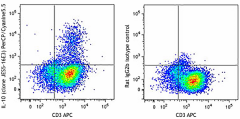
-

Th2-polarized lymphocytes from a C57BL/6 mouse were stimulated with PMA + Ionomycin for 6 hours (in the presence of monensin), surface stained with CD3 APC, fixed, permeabilized, and then stained with IL-10 (clone JES5-16E3) PerCP/Cyanine5.5 (left) or rat IgG2b PerCP/Cyanine5.5 isotype control (right).
| Cat # | Size | Price | Quantity Check Availability | Save | ||
|---|---|---|---|---|---|---|
| 505027 | 25 µg | 118€ | ||||
| 505028 | 100 µg | 268€ | ||||
IL-10 was originally described as Cytokine Synthesis Inhibitory Factor (CSIF) by virtue of its ability to inhibit cytokine production by Th1 clones. IL-10 shares over 80% sequence homology with the Epstein-Barr virus protein BCRFI. IL-10 inhibits IFN-γ, TNF-β, and IL-2 production by Th1 clones; inhibits macrophage-mediated IL-1, IL-6, and TNF-α synthesis; suppresses the delayed type hypersensitivity response; stimulates Th2 cell response (which results in elevated antibody production); and promotes mast cell proliferation in combination with IL-4.
Product DetailsProduct Details
- Verified Reactivity
- Mouse
- Antibody Type
- Monoclonal
- Host Species
- Rat
- Immunogen
- E. coli-expressed, recombinant mouse IL-10
- Formulation
- Phosphate-buffered solution, pH 7.2, containing 0.09% sodium azide.
- Preparation
- The antibody was purified by affinity chromatography and conjugated with PerCP/Cyanine5.5 under optimal conditions.
- Concentration
- 0.2 mg/ml
- Storage & Handling
- The antibody solution should be stored undiluted between 2°C and 8°C, and protected from prolonged exposure to light. Do not freeze.
- Application
-
ICFC - Quality tested
- Recommended Usage
-
Each lot of this antibody is quality control tested by intracellular immunofluorescent staining with flow cytometric analysis. For flow cytometric staining, the suggested use of this reagent is ≤0.25 µg per million cells in 100 µl volume. It is recommended that the reagent be titrated for optimal performance for each application.
* PerCP/Cyanine5.5 has a maximum absorption of 482 nm and a maximum emission of 690 nm. - Application Notes
-
ELISA or ELISPOT Detection1,9,11: The biotinylated JES5-16E3 antibody is useful as a detection antibody for a sandwich ELISA or ELISPOT assay, when used in conjunction with purified JES5-2A5 antibody (Cat. Nos. 504902 & 504904) as the capture antibody.
ELISA Capture: The purified JES5-16E3 antibody is useful as the capture antibody in a sandwich ELISA when used in conjunction with the biotinylated JES5-2A5 antibody (Cat. Nos. 504905 & 504906) as the detection antibody and recombinant mouse IL-10 (Cat. No. 575809) as the standard.
Neutralization14: The Ultra-LEAF™ purified JES5-16E3 antibody can neutralize the bioactivity of natural or recombinant IL-10.
Flow Cytometry3: The fluorochrome-labeled JES5-16E3 antibody is useful for intracellular immunofluorescent staining and flow cytometric analysis to identify IL-10-producing cells within mixed cell populations.
Additional reported applications (for relevant formats) include: immunohistochemistry3. - Application References
-
- Simkin G, et al. 2000. J. Immunol. 164:2457.
- Kitagaki K, et al. 2002. Clin. Diagn. Lab Immunol. 9:1260.
- Khanna A, et al. 2000. J. Immunol. 164:1346.
- Sander B, et al. 1993. J. Immunol. Methods 166:201.
- Litton M, et al. 1994. J. Immunol. Methods 175:47.
- Andersson U, et al. 1999. Detection and qunatification of gene expression. New York:Springer-Verlag.
- Finkelman F, et al. 2003. Curr. Prot. Immunol. John Wiley & Sons New York. Unit 6.28.
- Wang W, et al. 2004. FASEB J. 18:1043.
- Brummel R and Lenert P. 2005. J. Immunol. 174:2429.
- Lawson BR, et al. 2007. J. Immunol. 178:5366.
- Xu G, et al. 2007. J. Immunol. 179:5358. PubMed
- Brummel R, et al. 2005. J. Immunol.174:2429. PubMed
- Kang YJ, et al. 2007. Stem Cells 25:1814. PubMed
- Seo N, et al. 2001. Immunology. 103:449. (Neut)
- Product Citations
-
- RRID
-
AB_2561522 (BioLegend Cat. No. 505027)
AB_2561522 (BioLegend Cat. No. 505028)
Antigen Details
- Structure
- Acid-labile cytokine, dimer, 17-21 kD (Mammalian)
- Cell Sources
- Activated CD8+ T cells, Th0, Th2 subset of CD4+ T cells, Ly-1+ B cells, monocytes, macrophages, keratinocytes
- Cell Targets
- T cells, B cells, mast cells, macrophages
- Receptors
- IL-10R (CDw210)
- Cell Type
- Tregs
- Biology Area
- Immunology
- Molecular Family
- Cytokines/Chemokines
- Antigen References
-
1. Fitzgerald K, et al. Eds. 2001. The Cytokine FactsBook. Academic Press San Diego.
2. de Waal-Malefy R, et al. 1992. Curr. Opin. Immunol. 4:314.
3. Howard M, et al. 1992. Immunol. Today 13:198.
4. Quesniaux V. 1992. Res. Immunol. 143:385.
5. Norton SK, et al. 2008. J. Immunol. 180:2848. - Regulation
- Downregulated by IL-4, IL-10
- Gene ID
- 16153 View all products for this Gene ID
- UniProt
- View information about IL-10 on UniProt.org
Related FAQs
- How stable is PerCP/Cyanine5.5 tandem as compared to PerCP alone?
-
PerCP/Cyanine5.5 is quite photostable and also better than PerCP alone in withstanding fixation.
Other Formats
View All IL-10 Reagents Request Custom Conjugation| Description | Clone | Applications |
|---|---|---|
| APC anti-mouse IL-10 | JES5-16E3 | ICFC |
| Biotin anti-mouse IL-10 | JES5-16E3 | ELISA Detection,ELISPOT Detection,ICFC |
| FITC anti-mouse IL-10 | JES5-16E3 | ICFC |
| PE anti-mouse IL-10 | JES5-16E3 | ICFC |
| Purified anti-mouse IL-10 | JES5-16E3 | ELISA Capture,CyTOF®,IHC |
| Alexa Fluor® 647 anti-mouse IL-10 | JES5-16E3 | ICFC |
| PE/Cyanine7 anti-mouse IL-10 | JES5-16E3 | ICFC |
| Alexa Fluor® 488 anti-mouse IL-10 | JES5-16E3 | ICFC |
| Brilliant Violet 421™ anti-mouse IL-10 | JES5-16E3 | ICFC |
| Pacific Blue™ anti-mouse IL-10 | JES5-16E3 | ICFC |
| PerCP/Cyanine5.5 anti-mouse IL-10 | JES5-16E3 | ICFC |
| Purified anti-mouse IL-10 (Maxpar® Ready) | JES5-16E3 | ELISA Capture,CyTOF® |
| Brilliant Violet 605™ anti-mouse IL-10 | JES5-16E3 | ICFC |
| PE/Dazzle™ 594 anti-mouse IL-10 | JES5-16E3 | ICFC |
| APC/Cyanine7 anti-mouse IL-10 | JES5-16E3 | ICFC |
| Ultra-LEAF™ Purified anti-mouse IL-10 | JES5-16E3 | ELISA Capture,CyTOF®,ELISPOT Capture,Neut,ICFC,IHC |
| Brilliant Violet 650™ anti-mouse IL-10 | JES5-16E3 | ICFC |
| Brilliant Violet 711™ anti-mouse IL-10 | JES5-16E3 | ICFC |
Customers Also Purchased
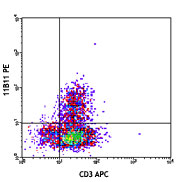
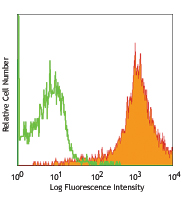
Compare Data Across All Formats
This data display is provided for general comparisons between formats.
Your actual data may vary due to variations in samples, target cells, instruments and their settings, staining conditions, and other factors.
If you need assistance with selecting the best format contact our expert technical support team.
-
APC anti-mouse IL-10
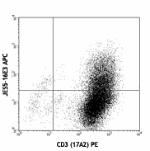
PMA/ionomycin-stimulated Th2-polarized Balb/c mouse splenocy... -
Biotin anti-mouse IL-10
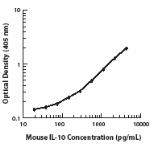
-
FITC anti-mouse IL-10
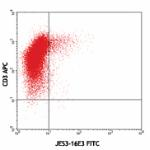
PMA-restimulated Th2-polarized C57BL/6 mouse splenocytes sur... 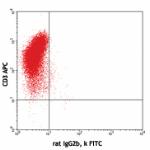
-
PE anti-mouse IL-10

PMA/Ionomycin-stimulated Th2-polarized Balb/c mouse splenocy... -
Purified anti-mouse IL-10

-
Alexa Fluor® 647 anti-mouse IL-10
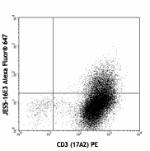
PMA/ionomycin-stimulated Th2-polarized Balb/c mouse splenocy... -
PE/Cyanine7 anti-mouse IL-10

PMA+ionomycin-stimulated Th2-polarized C57BL/6 mouse splenoc... -
Alexa Fluor® 488 anti-mouse IL-10
-
Brilliant Violet 421™ anti-mouse IL-10
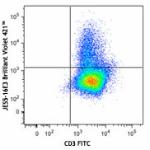
PMA+ionomycin-stimulated Th2-polarized C57BL/6 mouse splenoc... 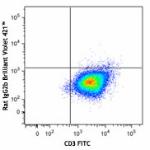
-
Pacific Blue™ anti-mouse IL-10
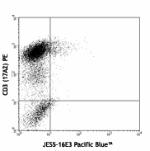
Th2 polarized C57BL/6 splenocytes stained with JES5-16E3 Pac... 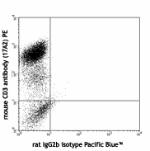
Th2 polarized C57BL/6 splenocytes stained with rat IgG2b iso... -
PerCP/Cyanine5.5 anti-mouse IL-10

Th2-polarized lymphocytes from a C57BL/6 mouse were stimulat... -
Purified anti-mouse IL-10 (Maxpar® Ready)
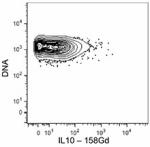
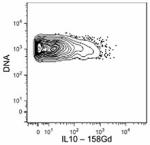
-
Brilliant Violet 605™ anti-mouse IL-10
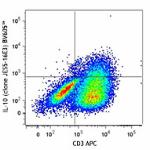
PMA+ionomycin-stimulated Th2-polarized BALB/c mouse splenocy... 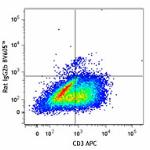
-
PE/Dazzle™ 594 anti-mouse IL-10
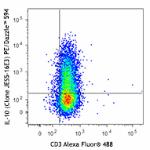
PMA+ionomycin-stimulated (six hours in the presence of monen... 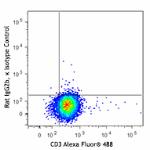
-
APC/Cyanine7 anti-mouse IL-10

PMA+ionomycin-stimulated (six hours in the presence of monen... -
Ultra-LEAF™ Purified anti-mouse IL-10

-
Brilliant Violet 650™ anti-mouse IL-10

PMA+ ionomycin-stimulated (six hours in the presence of mone... -
Brilliant Violet 711™ anti-mouse IL-10

PMA+ ionomycin-stimulated (six hours in the presence of mone...

 Login / Register
Login / Register 











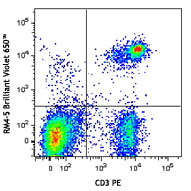
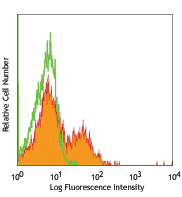



Follow Us